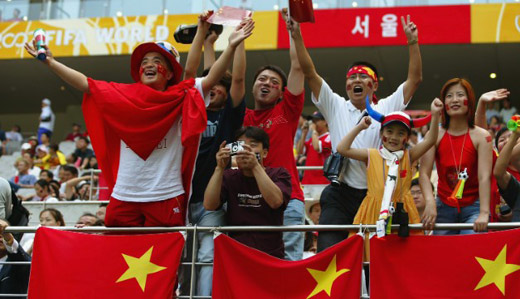
|
Thirty-two of the world's best football teams are now competing for the iconic golden World Cup trophy -- but the planet's most populous nation is not among them. Team China failed to qualify for the "beautiful game's" showpiece event in Brazil. In fact China's World Cup dream turned into a nightmare as early as 2011, when it was eliminated in a regional qualifying round. But for all the interest in football in this country of more than one billion people, it is a huge source of frustration that they can't field a competitive national team. China reached the finals only once back in 2002. I remember that heady year. There was a heroes' welcome for the national team, many of whom became icons with fat commercial endorsements. There was deleterious display of national pride accompanied by soaring expectations for Team China. But their debut turned out to be an embarrassing dud: they were knocked out after the group stage without scoring a single goal. Still, these setbacks have not deflated the football fever here. Chinese football fans have been enjoying the action in Brazil despite matches taking place after midnight, Beijing time. By hook or by crook, local fans are finding ways to stay up late for the games. Some took paid leave, others found excuses to stay home, such as getting doctors to sign sick-leave certificates. A man asked to take the day off ostensibly to attend a teacher-parent conference. Some managers say work place productivity has dropped lately. A few companies have simply conceded defeat, agreeing to a staggered work schedule to allow for some employees to stay in late, and come in late. Enthusiasm for the game brings commercial windfalls. The World Cup advertising revenue for Leshi, one of China's largest video websites is estimated to reach RMB100 million yuan ($16 million), said its top executive Qiang Wei. This summer alone CCTV, the state television network, could rake in as much as RMB1.5 billion yuan ($240 million) in advertising revenue -- 50% more than their earnings from the 2010 World Cup. Coca Cola has used its sponsorship with a World Cup Trophy Tour, where they took the trophy to over 90 countries and held consumer events. McDonald's ran point of sale promotions, which offered World Cup tickets to winners. Other brands created various content, featuring international and national team players to connect the brand to the event. Since the month-long competition opened in Brazil, legions of Chinese sports fans have been gathering for viewing parties in their living rooms, in factory and school dormitories, and in restaurants and bars, many of which have opened late for the fans to watch matches live on Chinese television. Of course, not all of these sleep-deprived folks are bona fide football fans. A posting on Baidu, China's largest search engine, noted that the Chinese have recently coined the word "wei qiumi," or "fake soccer fans," referring to people who watch the game only once in a while, who care more about the final scores rather than enjoying the actual games, and who think celebrity players play a more important role in matches than the coaches. |
32支世界上最好的球隊都在為世界杯金燦燦的獎杯而浴血奮戰,但地球上人口最多的國家卻并沒有參與其中。 中國隊還不夠資格去參與在巴西舉行的這場精彩賽事。事實上,中國的世界杯夢早在2011年就成了一場噩夢,當時其在亞洲區預選賽中失去了進軍巴西的資格。 但對這個對足球懷有極大興趣、人口超過十億的國家來說,不能組成一支具備競爭力的國家隊出現在賽場上是一個讓人十分沮喪的消息。 中國隊唯一一次踢進世界杯決賽是在2002年。我記得這令人興奮的一年。國家隊在國內受到了英雄般的待遇。球員們都獲得了收益豐厚的商業代言和贊助。伴隨著洋溢著的民族自豪感而來的是人們對國足日益增加的期望,但這卻不利于國足的成長。 而國足的首秀就以尷尬收場,他們在小組賽階段就已出局,并且一球未進。 盡管如此,這些挫折并沒有挫傷中國球迷的熱情。 盡管球賽在北京時間零點后開始,中國球迷依然關注著在巴西的每場比賽。 中國球迷千方百計地為熬夜看球尋找途徑。一些球迷請事假,其他的球迷則找借口呆在家中,比如找醫生開假條。一名男子以參加家長會為由請了一天假。 一些經理說工作效率在最近這段時間下降很多。一些公司作出讓步,同意交錯排班以允許一些雇員熬夜或遲到。 對比賽的熱情導致了商機傾盆而至。 中國最大的視頻網站樂視網在世界杯期間的廣告收入據估計達到了100萬人民幣,其首席執行官秦偉說道。 這個夏季,僅僅中央電視臺,這個國家的有線電視網,在廣告業務上就吸金高達15億人民幣——超過50%的收入都來自世界杯。 可口可樂運用其贊助權開啟了世界杯冠軍之旅,他們將獎杯帶至90個國家并舉行針對消費者的活動。 麥當勞進行銷售推廣,為中獎者提供世界杯球票。 自長達一個月的巴西世界杯開幕以來,大批的中國球迷聚集在客廳,工廠和學校的宿舍,餐廳以及酒吧觀看比賽。很多餐廳和酒吧為球迷觀看現場直播而延長營業。 當然,并不是所有的熬夜者都是忠實球迷。根據百度的一個帖子:中國最近產生了一個新造詞——偽球迷,指的是那些只偶爾觀看比賽,對球賽結果比球賽過程更關心及認為球星在比賽中比教練更重要的人。 (譯者 dulisa27 編輯 丹妮) 掃一掃,關注微博微信
  |
